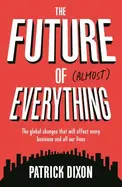
The Future of Almost Everything - by Patrick Dixon
ISBN: 1781254974Date read: 2015-10-10
How strongly I recommend it: 1/10
(See my list of 360+ books, for more.)
Go to the Amazon page for details and reviews.
On the plus-side, he's focused on future predictions that are most likely to happen. On the down-side, that means there are no big surprises. An interesting read, but not much I needed to take notes on.
my notes
The most shocking predictions are usually wrong. So we need to pay close attention to what is most likely and plan for the unexpected.
Markets are driven by investor mood. Wars are triggered by anger. Leadership is based on trust. Uptake of new technologies is linked to customer engagement and pleasure. Regulations are driven by activism. Elections are won by conviction. Team performance is driven by motivation. Relationships are formed by human needs, passions and desires.
Emotional reactions are usually far more significant than events themselves.
Most short-term debates about the future are NOT about what is going to happen, which is often fairly obvious, but about when.
Every trend tends to have its counterpart.
“News is what someone else does not want you to print. All the rest is advertising.”
We will see a new breed of hyper-mobile globalised individuals with no national loyalty or identity and no commitment to any geographical area, yet with friends in every city. These industrialised techno-gypsies consider themselves global citizens. They will be hard to tax and hard to count in census surveys, as well as hard to police.
Moving a container 150km by lorry from Birmingham to Southampton costs the same as moving the same container 10,000km by sea from Southampton to Beijing. It is cheaper to transport melons from Istanbul to Naples than to drive melons from a village up in the Italian mountains, to the same market. This overwhelmingly huge difference in freight costs will be one of the single greatest drivers of future global trade, despite increases in energy prices. Areas with major container ports will on average grow up to 40% faster over the next three decades than cities, regions or nations that are landlocked.
Videos are great for information but useless at transformation.